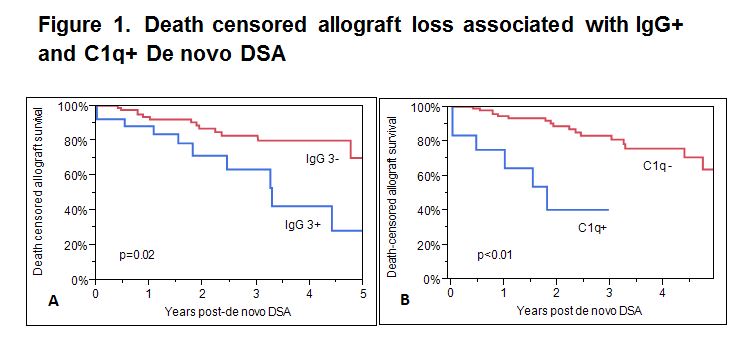C1q+ and IgG3+ De Novo Donor Specific Antibody Are Associated with Allograft Failure in a Multicenter Cohort.
1Mayo Clinic, Rochester, MN
2Terasaki Research Institute, Los Angelos, CA
3University of Michigan, Ann Arbor, Mi
4Cornell University, New York, NY
Meeting: 2017 American Transplant Congress
Abstract number: B68
Keywords: Biopsy, Graft survival, Kidney transplantation
Session Information
Session Name: Poster Session B: Antibody Mediated Rejection in Kidney Transplant Recipients II
Session Type: Poster Session
Date: Sunday, April 30, 2017
Session Time: 6:00pm-7:00pm
 Presentation Time: 6:00pm-7:00pm
Presentation Time: 6:00pm-7:00pm
Location: Hall D1
Introduction: De novo donor specific antibody (dnDSA) is a risk factor for antibody mediated rejection and allograft loss, but dnDSA does not always lead to allograft failure. Detailed dnDSA characterization [complement binding ability (C1q positivity) or IgG subclasses] have been shown to improve risk stratification. This study was to examine detailed dnDSA characteristics in a multicenter cohort of kidney transplant recipients and correlate with allograft loss.
Methods: At a centralized laboratory we measured total IgG, IgG 3, C1q, and IgG4 in banked serum collected at the time of dnDSA detected by routine surveillance in 112 patients from a multicenter cohort [Mayo (30) Cornell (30) Michigan (52)]. Modified total IgG LABscreen assays were used to test IgG3, C1q, and IgG4. DnDSA characteristics were correlated with allograft survival.
Results: Death censored allograft loss occurred in 23.0% (26/112) patients over a mean follow-up of 4.8 +/- 2.8 years and was similar among centers, p=0.10. IgG 3 was positive in 23.2% (26/112) of patients and was associated with reduced death-censored allograft survival (median 3.3yrs in IgG3+ vs. 5.5yrs in IgG3-, p=0.02) Figure 1A. C1q was positive in 10.1% (12/112) of patients and was also associated with reduced death censored allograft survival (median 1.8yrs in C1q+ vs. 5.5yrs in C1q-, p<0.001) Figure 1B. Both IgG3 and C1q was present in 6.3%(7/112) of patients. 57.1% of these patients (4/7) lost their graft during follow-up. DnDSA class, total IgG MFI, class of dnDSA, and the presence of IgG4 were not associated with graft loss, p=0.25, p=0.35, and p=0.70 respectively.  Conclusion: Testing for detailed dnDSA characteristics has prognostic value. Patients with IgG3+ and/or C1q+ dnDSA have a higher rate of death-censored allograft loss than those patients without these characteristics. Further study is needed to determine the associations among dnDSA characteristics and allograft histology.
Conclusion: Testing for detailed dnDSA characteristics has prognostic value. Patients with IgG3+ and/or C1q+ dnDSA have a higher rate of death-censored allograft loss than those patients without these characteristics. Further study is needed to determine the associations among dnDSA characteristics and allograft histology.
CITATION INFORMATION: Schinstock C, Everly M, Samaniego M, Gandhi M, Parikh R, Sharma V, Stegall M, Dadhania D. C1q+ and IgG3+ De Novo Donor Specific Antibody Are Associated with Allograft Failure in a Multicenter Cohort. Am J Transplant. 2017;17 (suppl 3).
To cite this abstract in AMA style:
Schinstock C, Everly M, Samaniego M, Gandhi M, Parikh R, Sharma V, Stegall M, Dadhania D. C1q+ and IgG3+ De Novo Donor Specific Antibody Are Associated with Allograft Failure in a Multicenter Cohort. [abstract]. Am J Transplant. 2017; 17 (suppl 3). https://atcmeetingabstracts.com/abstract/c1q-and-igg3-de-novo-donor-specific-antibody-are-associated-with-allograft-failure-in-a-multicenter-cohort/. Accessed February 25, 2026.« Back to 2017 American Transplant Congress
